Francis Brake was having a bad hair day. You know it’s bad when you get heckled while walking around a night market.
“Your haircut sucks,” someone told him. “You need a new one.”
The man with the blunt words was Louis Lee, (李俊生) 46, co-owner of Slick Barbershop in Taichung. He then offered Brake a free haircut. That was three years ago. Brake, a 32 year old Canadian, now lays down NT$800 every month for the latest hair trend: closely trimmed sides and long on the top. The 45-minute-long haircut includes a straight razor shave above the ears.
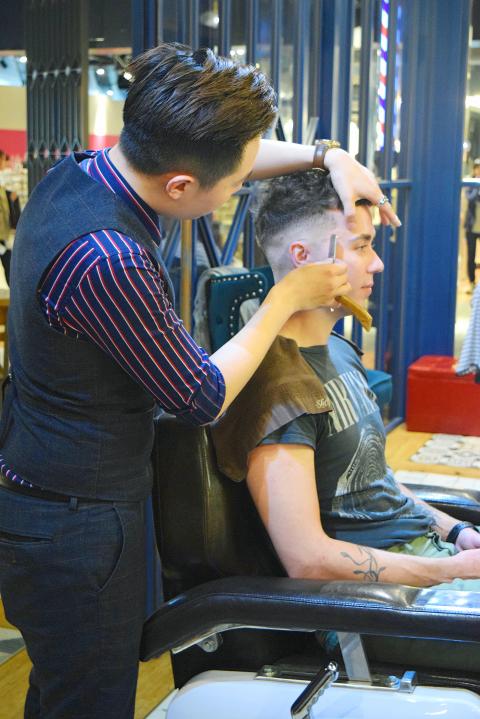
Photo: John Evans
“I didn’t know about these kinds of places before,” Brake said after getting a trim on a recent Saturday afternoon. “I know I’m going to get a good haircut here.”
While typical barbers might charge a few hundred New Taiwan dollars — with ones in the countryside costing even less — more millennials with disposable income have decided to go high end when it comes to their hair needs.
Of the thousands of barbershops in Taiwan, a handful have sprouted up in recent years that specialize in high-end haircuts tailored for men. It’s a throwback to a bygone era.
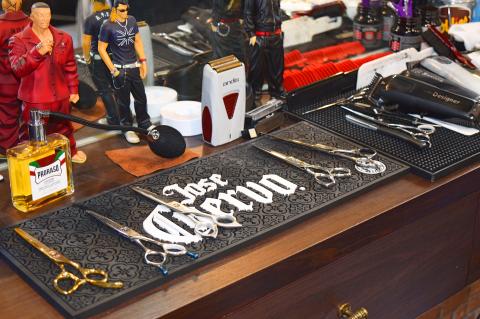
Photo: John Evans
There are roughly 30 such barbershops in Taiwan, according to the Asia Barber Association, an industry trade group based in Guangzhou, China. Lee, who serves as president of the association’s Taiwan region, expects this number to rise in the future.
MACULINITY AND BELONGING
While husbands might go to the same uni-sex hair salon as their wives, high-end barbershops are hoping to lure them away, playing up the feeling of masculinity and belonging. It’s a recent trend — going along with the growth in businesses specializing in men’s accessories, whether it’s custom made shoes or tailors with a gentlemen’s club-like atmosphere.
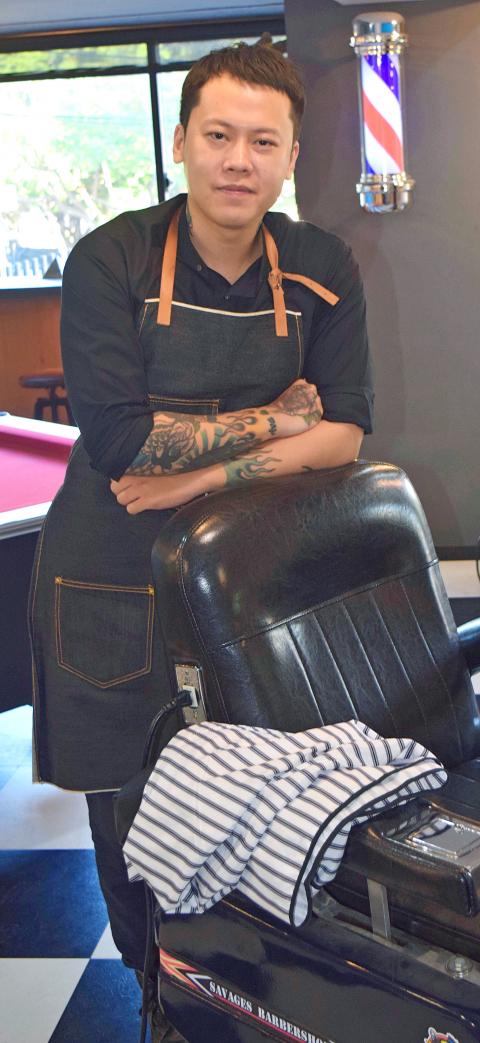
Photo: John Evans
“It’s something that men should experience,” Lee said. Slick, of which there are five in Taichung, recreates a feeling of a period more fitting of the 1940s and 1950s.
Adding to this mood is a movie poster of The Godfather, with a tuxedoed Marlin Brando looking over one of the barbershops.
Or in modern terms, Lee wants to recreate the feeling of the Kingsman movies, where finely-dressed spies outwit villains.
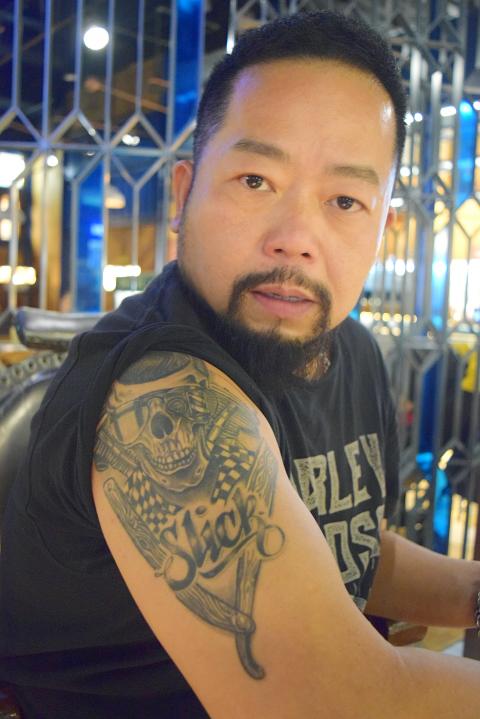
Photo: John Evans
Playing up this sense of coolness, whiskey, beer and coffee are offered complimentary.
“Getting a good haircut is kind of like a ceremony,” Lee said. “The goal is to get customers to relax and enjoy themselves.”
While Lee has the model down now, making it a business opportunity was by chance.
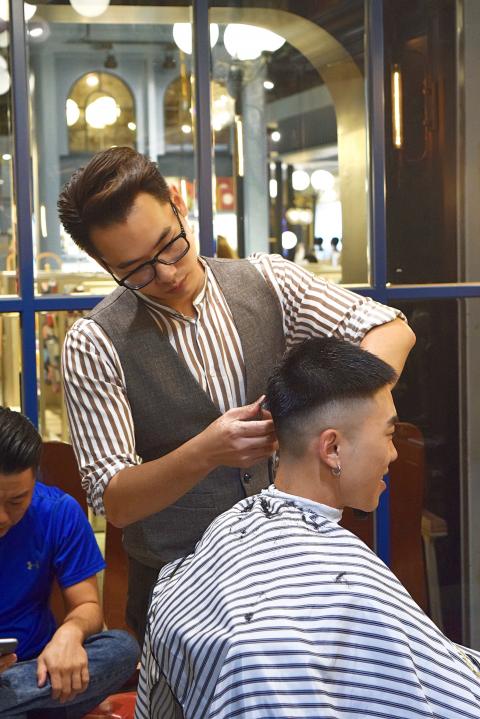
Photo: John Evans
Lee and his friend opened up a small shop in a Taichung night market three years ago that featured one barber’s chair and two Harley-Davidson motorcycles. The barber’s chair was so old that it came with an attached ashtray. Admittedly, it was a place to look cool.
“It was like making a man cave,” Lee said.
But unexpectedly, customers came — and kept returning. What was once just for fun, became a real business. Now business is booming, and Lee imagines opening more branches of Slick in the Taipei area.
At 200 haircuts per month, barber Hong Yu-yao (洪渝耀) is in demand. The 24 year old, clad in a tie, vest and patent leather shoes, is often booked a week in advance. Businessmen and other white-collar workers make up the bulk of his customers.
CUT AND A CHAT
While the cuts are often similar — short on the sides, floppy on the top — the topics of conversation vary with each customer. Aside from movies and sports, Hong chats about girlfriends, wives and love, doling out advice when needed.
“They’re not just my customers. They’re my friends,” said Hong, who is studying hair design at a local university.
Across town at Savages Barbershop it’s hard to miss the giant barber sign with ubiquitous red, blue and white stripes. The Taichung barbershop’s pool table and impressive collection of alcoholic drinks gives the place a social club-like atmosphere.
“It’s not just a barbershop,” said Harry Fu (傅華偉), 32, who co-owns three branches of Savages in Central Taiwan. “It’s a place where men can go to relax and be themselves.”
The music is ‘90s hip-hop and the walls are decorated with photos, including those of scantily clad women.
On the television one recent afternoon, the adult comedy Ted was being shown.
“No romantic comedies here,” Fu said.
While the style of Savages is loud and rebellious, it’s still all about the haircuts.
With eight retro-looking barber chairs, the barbershop specializes in the popular pompadour style. A shave and a haircut goes for NT$1,000. Fu said he drew inspiration for the business from traditional Western barbershops. As for Taiwan’s past history with barbershops, many were known less for their haircuts and more for places to meet women.
“I asked myself why Taiwan didn’t have any real barbershops,” Fu said. “And that’s what we wanted to make, a real barbershop.”

That US assistance was a model for Taiwan’s spectacular development success was early recognized by policymakers and analysts. In a report to the US Congress for the fiscal year 1962, former President John F. Kennedy noted Taiwan’s “rapid economic growth,” was “producing a substantial net gain in living.” Kennedy had a stake in Taiwan’s achievements and the US’ official development assistance (ODA) in general: In September 1961, his entreaty to make the 1960s a “decade of development,” and an accompanying proposal for dedicated legislation to this end, had been formalized by congressional passage of the Foreign Assistance Act. Two

Despite the intense sunshine, we were hardly breaking a sweat as we cruised along the flat, dedicated bike lane, well protected from the heat by a canopy of trees. The electric assist on the bikes likely made a difference, too. Far removed from the bustle and noise of the Taichung traffic, we admired the serene rural scenery, making our way over rivers, alongside rice paddies and through pear orchards. Our route for the day covered two bike paths that connect in Fengyuan District (豐原) and are best done together. The Hou-Feng Bike Path (后豐鐵馬道) runs southward from Houli District (后里) while the

March 31 to April 6 On May 13, 1950, National Taiwan University Hospital otolaryngologist Su You-peng (蘇友鵬) was summoned to the director’s office. He thought someone had complained about him practicing the violin at night, but when he entered the room, he knew something was terribly wrong. He saw several burly men who appeared to be government secret agents, and three other resident doctors: internist Hsu Chiang (許強), dermatologist Hu Pao-chen (胡寶珍) and ophthalmologist Hu Hsin-lin (胡鑫麟). They were handcuffed, herded onto two jeeps and taken to the Secrecy Bureau (保密局) for questioning. Su was still in his doctor’s robes at

Mirror mirror on the wall, what’s the fairest Disney live-action remake of them all? Wait, mirror. Hold on a second. Maybe choosing from the likes of Alice in Wonderland (2010), Mulan (2020) and The Lion King (2019) isn’t such a good idea. Mirror, on second thought, what’s on Netflix? Even the most devoted fans would have to acknowledge that these have not been the most illustrious illustrations of Disney magic. At their best (Pete’s Dragon? Cinderella?) they breathe life into old classics that could use a little updating. At their worst, well, blue Will Smith. Given the rapacious rate of remakes in modern